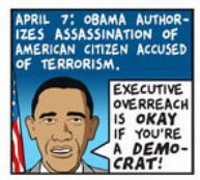A Censorship-Resistant Web sets out a sketch of a way to create fail-safe distributed copies of web pages (i.e. not centralized in a single point of failure like at archive.org) thought likely to suffer political risk, to authenticate them as genuinely by the original author, and to help browsers find them if the original were to vanish.
What’s nice about this system is that it gets you censorship resistance without introducing anything wildly new. There are already certificate authorities. There are already hash-to-URL servers. There are already mirrors. There’s already Tor. (There’s already tor2web.) The only really new thing specific to censorship resistance is URL-to-hash servers of the form I described, but they’re very simple and hopefully uncontroversial.
There is some work to be done stitching all of these together and improving the UI, but unlike with some other censorship-resistance systems, there’s nothing you can point to as having no good purpose except for helping bad guys. It’s all pretty basic and generally useful stuff, just put together in a new way.
(Spotted via Cory Doctorow)
I like this kind of stuff, and this seems the start of a fine effort. But it made me think, and I’m afraid that I had an evil idea. The same techniques that allow users to navigate to the backup pages(s) also will allow the party that took down the page in the first place to find the duplicate(s), and it will rarely be hard to trace these to their respective owners. So if this form of future-proofing becomes frequent for politically sensitive materials, I expect the cross-border aspect of the denial-to-denial-of-service-attack to be overcome by executive agreement or treaty.
The difficulty for the censor in the USA, however, is that pesky First Amendment. I can see two ways that a determined government might try to get around it other than directly applying its scary and expansionist reading of the Espionage Act. The first would be to argue the still-open issue regarding the supremacy of treaties over the Bill of Rights. But that’s rather major, and would depend on the content of the hypothetical international agreement. It may also be unnecessary.
A sneakier work-around the First Amendment might go as follows:
- Seize the copyright of the online version. This might be done on a claim that the text is contraband or was acquired with contraband. Alternately, the seizure might be effected under the standard condemnation power, in which case just compensation would be due to the original owner in order to comply with the Fifth Amendment.
- Once the government has the copyright it then applies the DMCA to all the (domestic) copies and has them taken down. It applies to foreign countries to do the same under the proliferating DMCA clones around the world.
There are a couple of complexities that need explanation.
First, the US government doesn’t usually claim copyright in the work product of its employees, which would make the claim that there is a copyright to seize difficult if the government was the original author of the leaked work (the WikiLeaks situation). That’s from 17 USC § 105,
Copyright protection under this title is not available for any work of the United States Government, but the United States government is not precluded from receiving and holding copyrights transferred to it by assignment, bequest, or otherwise.
But imagine that § 105 was amended, and the government did start to claim copyright in its employees’ works, or maybe just in all classified works produced by the government or its contractors and agents. On the one hand, this would seem to avoid the need to seize the copyright, since the government would already have it and could instead go straight to the DMCA.
On the other hand, however, the government would face a difficulty in that in order to claim copyright over the posted work, the government would have to admit that the work was authentic, something the US government has studiously avoided doing (officially) in the WikiLeaks case.
Perhaps, however, the government could invent some new procedure in which it went to District Court and proceeded in the alternative, saying it was either seizing the copyright, or not (leaving the question of just compensation for any subsequent proceeding in which someone claiming to have the copyright could come forward in the Court of Claims), but in either case now claimed entitlement to a declaration that it had the authority to apply the takedown clauses of the DMCA?
Anyway, all this is too horrible. I hope a real copyright lawyer can come along and explain why it is nonsense. And by posting it on the day of the year when no one reads this blog, I hope I’ve both established priority in the unlikely event this both isn’t nonsense and is original, and also limited the chance of the idea taking off.


